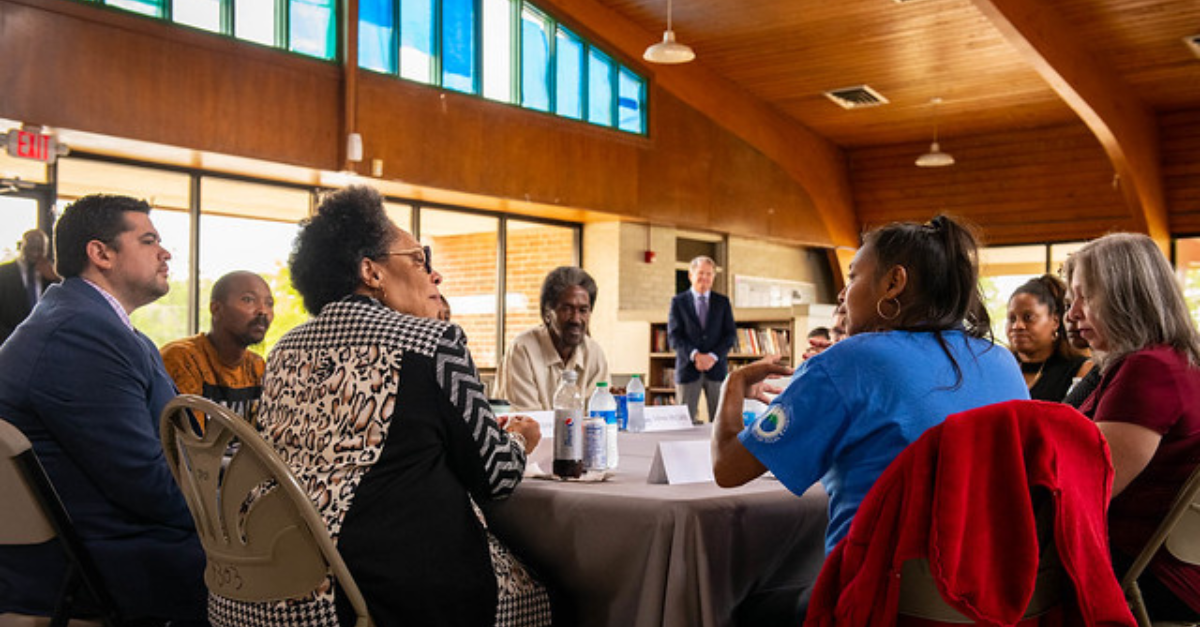Over our 45 years working in neighborhood transformation, we’ve learned that narrative matters. Prevailing narratives can either shape, reinforce or shift accepted truths, widely held mental models and prevailing biases. And ultimately, narratives influence the equitability of resource allocation – financial, non-financial and human. This post is a call to action for practitioners in the equitable community development industry urging greater intentionality in our shared narrative around the notion of “capacity building”.
BIPOC leaders – and the organizations we steward – are not somehow inherently deficient in our knowledge or skills. It is time for philanthropy and the nonprofit sector as a whole to acknowledge this longstanding deficiency narrative and the manner in which it erroneously centers Black, Indigenous, and Person of Color led organizations – regardless of their sector – consistently characterizing us as needing to “build capacity.”
The Call for “Capacity Building” is Not a Solution
At Urban Strategies, Inc. (USI), we are committed to ensuring equitable opportunities for all children and families to thrive. We approach the task of neighborhood transformation (across more than 25 diverse geographies in the U.S. and the Caribbean) first with a firm recognition of the immense assets and wisdom already present within each community in the form of elders, local leaders, and agencies with whom we are privileged to partner. In our collaborations with stakeholders nationwide, we have encountered transformative, albeit smaller agencies, making substantive impact in their focus neighborhoods with a relatively modest base of funding. These agency partners strive to do what they can for the populations they serve with what they have available. Their ingenuity, resourcefulness, and innovation – to do so much with comparatively less – merits our respect. To quote the Equity Manifesto written by our colleagues at PolicyLink:
Capacity Building is Disinvestment
However, over the last several decades grant makers, public funders and philanthropic intermediaries have become not only enthralled with the phrase “capacity building” but also committed to an approach that privileges and elevates white-led consulting firms and consultants over the local leaders of color and their teams with deeply seated expertise in the issues and communities they serve. This not only dismisses the wisdom and creativity of local leaders but perpetuates a fundamental assumption that communities can’t solve their own problems and need “experts” from the outside who are not POC led to adequately deliver results.
The current approach to capacity building diverts dollars away from the actual point of impact in communities – an arrangement that is maintained by an undercurrent of antiblackness practices, as well as the economic “insider baseball” still played between consulting firms and funders. If we want results in our neighborhoods and in society at-large, that kind of unearned privilege must change.
As is, it culminates in an unconscionable system that justifies why critically important dollars are withheld from POC-led nonprofits through smaller grant sizes, more restrictive funding agreements, and/or short-term project-oriented awards instead of the transformational, unrestricted, multi-year funding relationships that characterize real partnership, trust and respect of grantee’s expertise, knowledge and skill. While We saw some changes in how funding relationships took shape in the wake of 2020’s racial reckoning in America – we must ask: have the preponderance of those commitments materialized into real resources moved in a new manner? Have the relationships spawned then continued?
Growing out of the international development aid sector of the 1950s and 60s, the term capacity building carries an inherent antiblackness rooted in European colonialism and steeped in racialized capitalism, extraction, assumptions of Black and indigenous inferiority and the intent of “third world” exploitation. Given these origins, the resulting inequities we currently observe in our own social sector (which borrowed the term) are no surprise. As with all language, could we truly expect the phrase to outrun its origins?
Marcus Littles, founder of Frontline Solutions, notes, “Capacity building overvalues the perspectives and acumen of the capacity builder.” His colleague, Frontline CEO, Melissa DeShields, similarly argues that “capacity building processes are often implemented in ways that lack reciprocity and reinforce harmful power dynamics” and that “[capacity building processes] focus on deficits rather than assets. If words matter, then why do we use a term —and operate within a framework—that might be harmful?”
Moving Beyond Capacity Building
To move beyond this, we must recognize the role of resourcing in creating (or not) the built infrastructure for businesses and leaders to thrive. Replacing the term “building capacity” with the term “building infrastructure” moves us away from a focus on deficits, emphasizes the strengths and assets already present within communities, and directs us toward enhancing/leveraging these strengths and assets rather than implying deficiencies in people where they do not exist. As an industry we need to take a sweeping look at how shared language is contributing to the very problems we are seeking to solve. Deficit-based language generates deficit-based solutions. As a national intermediary in this work, USI is intentionally changing our language to reflect the above. This is a blog is a call to action for our partners to follow suit.
Changed language is one step towards achieving equity and equality in our industry. Our call for a shift away from harmful rhetoric is not about politeness, professional courtesy or even political correctness. Language that offends is a problem. Language that perpetuates anti-blackness is a full-blown crisis. One that even the most poignant of equity statements won’t begin to resolve.
References
• Reimagining Capacity Building: Navigating Culture, Systems & Power (GEO)
• Should We Cancel Capacity-Building? (Marcus Littles, Nonprofit Quarterly)
• Capacity Building. (Wikipedia)
• What is Capacity Building? | National Council of Nonprofits
